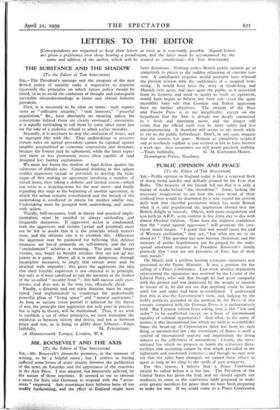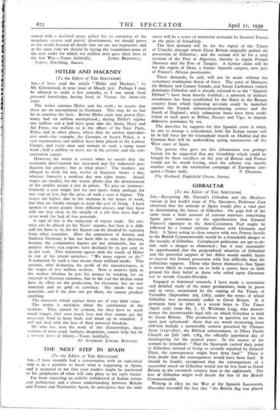PUBLIC OPINION AND PEACE
[To the Editor of THE SPECTATOR] SIR,—Public opinion in England today is like a scattered flock of sheep being quickly and skilfully penned by the Fear that Barks. The majority of my friends tell me that it is only a matter of weeks before "the showdown." Some, lacking the necessary imagination to see how the even trend of their civilised lives would be disjointed by a war, regard the present drift with that cheerful pessimism which has made Britain what it is and popularised the impression abroad that the British delight in funerals. Others, with more imagination and less faith in A.R.P., seem content to live from day to day with almost Oriental fatalism. None have the slightest confidence that the "stand against aggression" will postpone the cata- clysm much longer. "I grant that war would mean the end of Western civilisation," they say, "but what are we to do about it? " This question has now become rhetorical, and the measure of public hopelessness can be gauged by the wide- spread emotional response to President Roosevelt's timely platitude that "men are not prisoners of Fate, but of their own minds."
On March zoth a petition bearing 1,roo,00o signatures was presented to the Prime Minister. It was a petition for the calling of a Peace Conference. Last week another deputation representing the signatories was received by the Leader of the Liberal Party, who said that though he had great sympathy with the project and was impressed by the weight of opinion in favour of it, he did not see that anything could be done until law and order had been re-established. I understand that this is also the Government's view, and, judging by the feeble publicity accorded to the petition by the Press of this country compared with the German Press, it is authoritatively held. But I cannot refrain from asking, how is this "law and order" to be established except on a basis of international equality of colonial opportunity? And what, in the name of justice, is this international law which we wish to re-establish? Since the break-up of Christendom there has been no such thing as international law ; the sovereignty of States is itself a symbol of international anarchy and imperialism the living witness to the selfishness of nationalism. Clearly, the inter- national law which we propose to bomb the refractory dicta- torships into accepting cannot be that which prevailed in the eighteenth and nineteenth centuries ; and though we may now say that the rules have changed, we cannot force others to agree as long as we cling to the spoils of past conquests.
For this reason, I believe that a Peace Conference should be called before it is too late. The President of the United States has given the lead, and we should signify our readiness to come to the conference table prepared to make even greater sacrifices for peace than we have been preparing to make for war. If we could come to a Peace Conference
armed with a declared peace policy for an extension of the mandates system and partial disarmament, we should prove to the world beyond all doubt that we are not hypocrites and at the same time we should be laying the foundation-stone of the new order for which ten million men gave their lives in











































 Previous page
Previous page